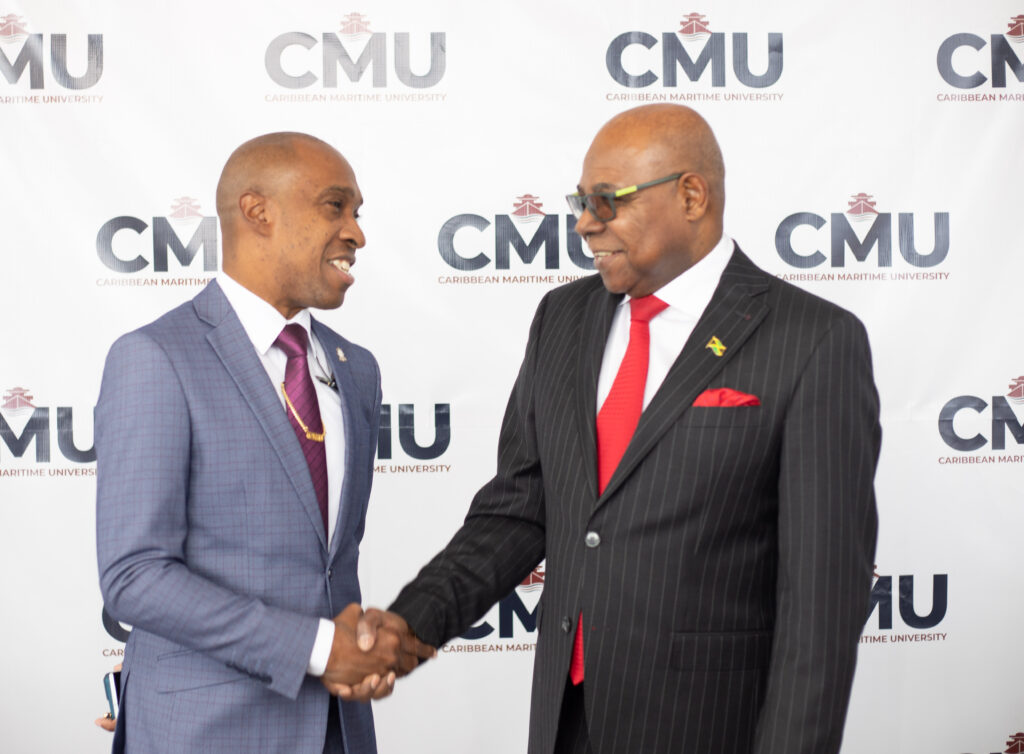
CMU President, Professor Andrew Spencer shares a handshake with the Minister of Tourism, the Honourable Edmund Bartlett at the CMU Port Royal Lecture Series
Kingston, Jamaica – Over 200 people gathered on the Caribbean Maritime University’s Main Campus on Tuesday as it hosted its inaugural Port Royal Lecture Series under the theme, “The Blue Economy – Regeneration and Resilience.”
CMU President, Professor Andrew Spencer, set the stage for the lecture, highlighting that the Blue Economy is the overall contribution of the oceans to economies. The World Bank defines it as the “sustainable use of ocean resources for economic growth, improved livelihoods and jobs, and ocean ecosystem health”. As the seventh largest economy, it boasts an average of JM $1.3 trillion per.
Over 90% of the world’s trade is done by sea, and Jamaica having a relatively small land mass, relies heavily on the blue economy. Some benefits of the blue economy include job creation, food security, mitigating climate change, and shipping and trade, among other things. Therefore, it has to potential to increase the economic growth of the Caribbean and address issues such as unemployment, food shortages, poverty, climate change and renewable energy sources.
Professor Spencer spoke to the fact that the blue economy must be looked at from an empirical viewpoint, not just to pull the data that extracts value but also to look at data that helps us protect the marine space’s value. He also highlighted that this becomes crucial against the backdrop of Sustainable Development Goal 14 – concern and sustainable use of the oceans, seas and marine resources for sustainable development.
In his keynote address, Minister of Tourism, the Honourable Edmund Bartlett pointed out that greater moral responsibility to protect the fragile and gradually depleting ocean and marine systems that have become increasingly susceptible to artificial phenomena needs to be taken on by those who harness the sea and marine resources in their value chains.
Bartlett also stressed that tourism-related activities, for which Jamaica is heavily dependent, impose significant stress on coastal and marine ecosystems. Areas within which tourists visit have been under increasing pressure from the damage and pollution caused by tourist facilities and supporting infrastructure.
“Indeed, tourism stakeholders must play their part to promote a sustainable blue economy through awareness raising, behavioural modifications, identifying gaps as well as innovative and scalable solutions.”
Other presenters at the Port Royal Lecture series were Ambassador Joachim Schmillen, Vice President of the CMU; Ambassador Olivier Guyonvarch, Ambassador of France to Jamaica and Permanent Representative to the International Seabed Authority; and Senator the Honourable Matthew Samuda, Minister without Portfolio in the Ministry of Economic Growth and Job Creation.
Samuda, in his presentation, stated, “the Jamaican ocean is significantly more valuable than the Jamaican land.” He further expressed that “the rate of climate change is already having a devastating impact on the health of our oceans.”
“The reality is, we have a lot of work to do in a very short period of time if we are to leverage the value of our assets on land and leverage the value of our assets at sea, and we are on the front lines of climate change, which exacerbate the problem and means we have to work that much faster if we’re to take advantage of the systems that we have,” he said.
The series also saw key players from the tourism and marine sectors.
As the CMU redefines maritime excellence through innovation, research and technology, it has positioned itself as a thought leader in the blue economy.
The CMU is the only specialised public university and the Caribbean’s only maritime university. It offers degrees, certificates, and diplomas in the Faculties of Marine and Nautical Studies, Engineering and Applied Technology, Shipping and Logistics, and the Centre for Security, Counter Terrorism and Non-Proliferation.
Interested persons can apply at www.cmu.edu.jm.



Recent Comments